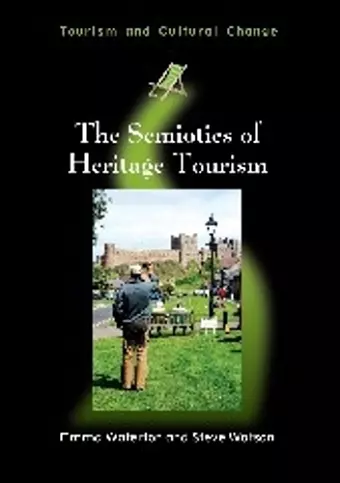The Semiotics of Heritage Tourism
Steve Watson author Emma Waterton author
Format:Paperback
Publisher:Channel View Publications Ltd
Published:20th Jan '14
Should be back in stock very soon

The book should become a must-read for everyone: those who are learning tourism, those who are managing tourism and those who are 'being' tourism. The messages of encoding and, more so, decoding are made evident through the authors' presentations of the heritage interpretations they encounter within the book. -- Alan Clarke, University of Pannonia, Veszprem, Hungary Journal of Heritage Tourism, 2015
This book presents a new way of understanding heritage tourism that focuses on what people feel and not just what they see. Traditionally, semiotics points to the study of signs and symbols, and how we use them to make sense of the world. Here semiotics is extended into our other senses as part of what it means to experience heritage as tourists.
This book is a fast-paced and thorough re-evaluation of what heritage tourism means to the people who experience it. It draws on contemporary thinking in human geography and heritage studies, and applies it to a sector of tourism that is both pervasive yet poorly researched in terms of the perspective of tourists themselves. In a series of lucid and tightly argued chapters, it traces the use of semiotics as an analytical tool from its theoretical origins in text, through the all-important dynamics of visuality into an expanded realm of feeling and sensuality. Challenging assumptions about the way that heritage is experienced, this book uses examples from around the world to explore the semiotic landscape that surrounds heritage sites, linking what is represented about the past and how it feels to be there.
It is an ambitious, seemingly impossible, task the authors set themselves. Within the narrow space of mere 123 pages the authors review classic perspectives on visuality and representation, discuss them against recent critical positions, and develops their own position that leaves room for embodiment, affect, and performance as a way into exploring the processes and spaces between performance and representation. They also propose a research agenda for heritage/tourism research. All in all, the authors meet the challenges brilliantly. The ambitions of the book combined with the clear and fast-paced style of argumentation and writing provides the reader with a book that easily can be used in graduate/postgraduate courses as well as short welcome reviews of the state-of-the-art of semiotic approaches to heritage, leisure, tourism with a focus on performance, affect and embodiment.
-- Maximiliano E. Korstanje, University of Palermo, Argentina * Annals of Tourism Research 50 (2015) 173–181 *Semiotics is most usually conceptualized as a theoretical abstraction about an indivisible signifier/signified integer. Waterton and Watson go much further by considering the semiotics of heritage tourism as a sense-making process that is embodied, performed, felt and emotionally charged. In so doing, they begin to shift the ocular-centrism and the logo-centrism of heritage tourism theoretically and as a practice. This is a considerable achievement and demands our attention.
* Russell Staiff, University of Western Sydney, Australia *This rare and wonderfully accessible book represents one of the finest pieces of theoretical scholarship in the heritage field. Waterton and Watson advance a theory of semiotics that goes beyond the visual to embody emergent fields of research in the realms of the representational and non-representational. The book represents a key text in heritage studies and is an exemplary landmark in heritage scholarship.
* Divya Tolia-Kelly, Durham University, UK *Waterton and Watson skilfully integrate several emergent dialogues in critical heritage studies and tourism studies centred on theories of affect, the senses, memory, and meaning-making. The authors make a most extraordinary contribution to evolving conceptualizations of tourists as sensing, performing, subjectively situated agents engaged in inter-subjective, embodied encounters with the institutionalized semiotics of authorized and commodified heritage discourses, not passive consumers of such.
* Joy Sather-Wagstaff, North Dakota State University, USA *The timely and provocative contribution made by Waterton and Watson to the general re-theorisation of heritage and tourism will doubtless find this concise volume a place on most reading lists and bibliographies across the discipline.
* Colin Sterling, UCL, in Papers from the Institute of Archaeology 24(1)ISBN: 9781845414207
Dimensions: 210mm x 148mm x 9mm
Weight: 206g
152 pages